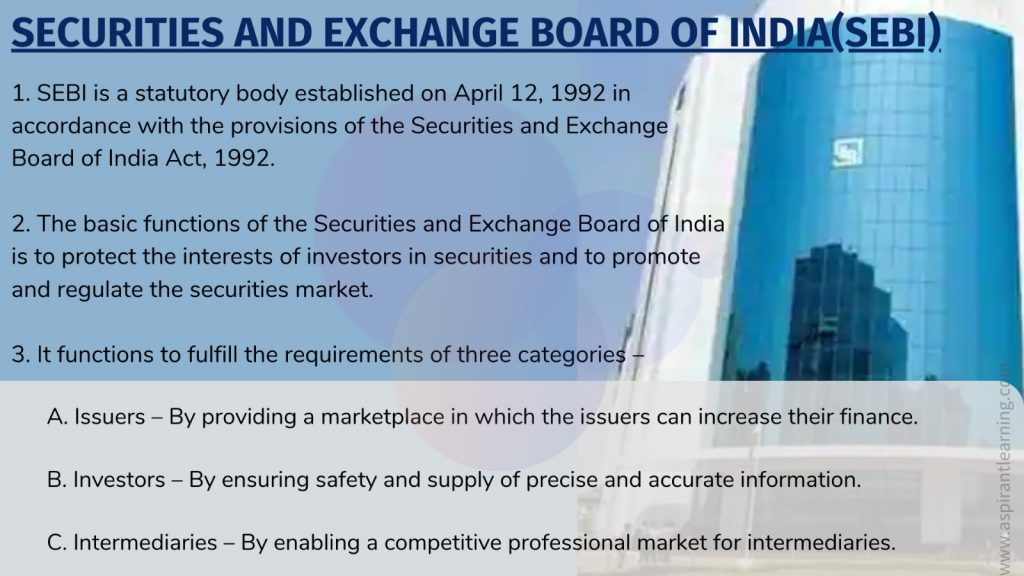News Highlights:
Recently, the National Stock Exchange of India received final approval from the markets regulator Securities and Exchange Board of India (SEBI) to set up a Social Stock Exchange (SSE).
Key takeaway:
The idea of SSE under the market regulator’s ambit was first floated by the Finance Minister in her Budget speech for the financial year 2019-20.

Social Stock Exchange:
- About:
- The SSE would function as a separate segment within the existing stock exchange and help social enterprises raise funds from the public through its mechanism.
- Social enterprise can be defined as a non-loss, non-dividend paying company created and designed to address a social problem.
- It would serve as a medium for enterprises to seek finance for their social initiatives, acquire visibility and provide increased transparency about fund mobilisation and utilisation.
- Retail investors can only invest in securities offered by for-profit social enterprises (SEs) under the Main Board.
- In all other cases, only institutional and non-institutional investors can invest in securities issued by SEs.
- Social activity:
- The social enterprises will have to engage in a social activity out of 16 broad activities listed by the regulator.
- It includes eradicating hunger, poverty, malnutrition and inequality; promoting healthcare; supporting education, employability and livelihoods; gender equality empowerment of women and LGBTQIA+ communities; and supporting incubators of social enterprise.
- Objectives:
- The initiative aims to help social and voluntary organisations working for social causes raise capital as equity or debt or a unit of the mutual fund.
- It provides new and cheaper sources of financing for social welfare projects while showcasing India’s independence from foreign aid.
- Tax benefits:
- Investors will get Section 80G benefits which allow all investments in securities/instruments of NPOs listed on SSE to be tax deductible.
- Investment by companies will be considered part of their Corporate Social Responsibility (CSR) initiatives.
Framework for Social Stock Exchange:
- A Separate segment
- SSE will be a separate segment of the existing stock exchanges.
- Eligibility:
- Any non-profit organisation (NPO) or for-profit social enterprise (FPSE) that establishes the primacy of social intent would be recognised as a social enterprise (SE), which will make it eligible to be registered or listed on the SSE.
- Non Eligibility
- Corporate foundations, political or religious organisations or activities, professional or trade associations, and infrastructure and housing companies, except affordable housing, will not be eligible to be identified as a social enterprise.
- Minimum requirements for Not-for-Profit Organisation
- NPO needs to be registered as a charitable trust and should be registered for at least three years; it must have spent at least Rs 50 lakh annually in the past financial year and should have received funding of at least Rs 10 lakh in the past financial year.
- Disclosure requirements for NPOs raising funds through the issuance of zero-coupon-zero principal instruments and putting in place annual disclosure requirements that need to be made by NPOs on such exchanges.
- Registration of NPO
- The entities must be registered in India as a “charitable trust registered under the public trust statute of the relevant state” or under the Societies Registration Act, 1860, or the Indian Trusts Act, 1882, or incorporated as a company under Section 8 of the Companies Act, 2013.
- Statement of utilisation
- Listed NPO will have to submit a statement of the utilisation of funds to SSE, as mandated under SEBI’s rules, within 45 days from the end of the quarter.
- Annual Impact Report (AIR)
- SEBI has asked social enterprises raising funds using SSE to disclose the Annual Impact Report (AIR) within 90 days from the end of the financial year.
- It will capture the qualitative and quantitative aspects of the social impact generated by the entity and, where applicable, the impact generated by the project or solution for which funds have been raised on SSE.
Instruments for non-profit social enterprises:
- Zero coupon zero principal bonds:
- Allowing NPOs to directly list on the SSE through the issuance of bonds in the form of zero-coupon or zero principal bonds.
- This is a feasible option to unlock funds from donors, philanthropic foundations and CSR spenders.
- These bonds would carry a tenure equal to the duration of the project that is being funded, and at tenure, they would be written off the investor’s books.
- Social Venture Funds (SVF):
- An SVF is a category 1 Alternative Investment Fund (AIF) that is already allowed by SEBI to issue securities or units of social ventures to investors.
- Mutual funds:
- An asset management company could offer closed-end mutual fund units to investors.
- The units could be redeemable in principal terms, but all of the returns could be channelled towards suitably chosen NPOs by the fund, which acts as the intermediary.
- Pay-for-success models:
- Pay-for-success models through lending partners or through grants are highlighted as effective mechanisms to ensure a more efficient and accountable deployment of capital.
Instruments for for-profit social enterprises (FPEs):
- Equity listing:
- FPEs would list equity on the SSE subject to a set of listing requirements, including operating practices (financial reporting and governance) and social impact reporting.
- Social Venture Funds (SVFs):
- AIFs and SVFs already exist for FPEs but do not require social impact reporting.
Conclusion:
- India is home to more than 2 million social enterprises (non-profits, for-profits), hence the recommendations regarding listing the Non-Profit Organisations on the social stock exchange need careful planning. While formulating such recommendations for India, it is required to have an extensive and cautious approach in terms of its accreditation, valuation and monitoring.
- There is a need to learn from other countries, e.g. In London, where SSE acts more as a directory connecting social enterprises with potential investors, while in Canada as an online platform where even retail investors can invest in funds or companies with social impact.
Pic Courtesy: Freepik
Content Source: The Hindu



